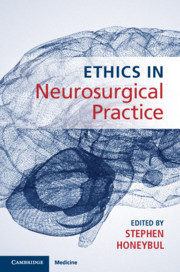Book contents
- Ethics in Neurosurgical Practice
- Ethics in Neurosurgical Practice
- Copyright page
- Contents
- Contributors
- Introduction
- Part I General Ethics
- Chapter 1 Introduction to Ethics and Ethical Theory
- Chapter 2 Models and Methods in Ethics
- Chapter 3 The Concept and Implementation of Values-Based Medicine (VsBM) in Neurosurgery
- Chapter 4 The Three Functions of Consent in Neurosurgery
- Chapter 5 Withholding and Withdrawing Medical Treatment: Legal, Ethical, and Practical Considerations
- Chapter 6 Surgical Training
- Chapter 7 The Aging Surgeon
- Chapter 8 Healthcare Economics
- Chapter 9 Patient Data, Ownership, Storage, and Social Media
- Part II Neurosurgery-Specific Bioethics
- Part III Future Developments
- Index
- References
Chapter 5 - Withholding and Withdrawing Medical Treatment: Legal, Ethical, and Practical Considerations
from Part I - General Ethics
Published online by Cambridge University Press: 29 May 2020
- Ethics in Neurosurgical Practice
- Ethics in Neurosurgical Practice
- Copyright page
- Contents
- Contributors
- Introduction
- Part I General Ethics
- Chapter 1 Introduction to Ethics and Ethical Theory
- Chapter 2 Models and Methods in Ethics
- Chapter 3 The Concept and Implementation of Values-Based Medicine (VsBM) in Neurosurgery
- Chapter 4 The Three Functions of Consent in Neurosurgery
- Chapter 5 Withholding and Withdrawing Medical Treatment: Legal, Ethical, and Practical Considerations
- Chapter 6 Surgical Training
- Chapter 7 The Aging Surgeon
- Chapter 8 Healthcare Economics
- Chapter 9 Patient Data, Ownership, Storage, and Social Media
- Part II Neurosurgery-Specific Bioethics
- Part III Future Developments
- Index
- References
Summary
Consent also serves a third function - the relational function - by providing an environment that fosters relationships of trust between the treating team, the patient and their family. In neurosurgery, where patients are faced with death and have few if any choices open to them beyond surgery, and where surgery is very risky and its’ outcomes difficult to predict, it can be argued that the permissive and risk functions of consent become less important, and the relational function comes to the fore.
- Type
- Chapter
- Information
- Ethics in Neurosurgical Practice , pp. 39 - 53Publisher: Cambridge University PressPrint publication year: 2020

